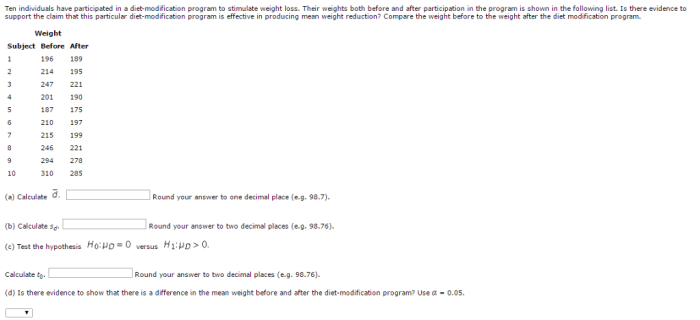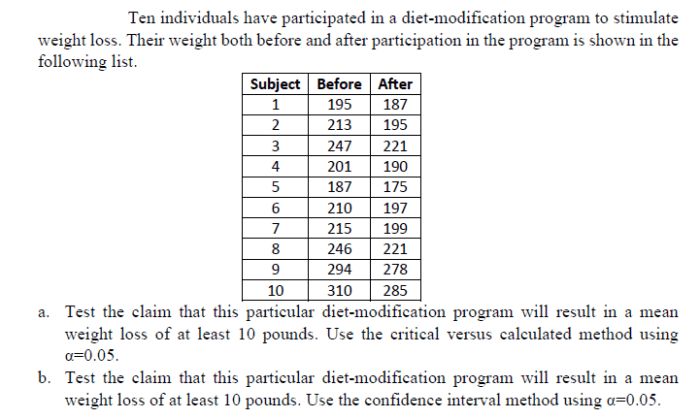Ten individuals have participated in a diet-modification – With ten individuals embarking on a groundbreaking diet modification journey, this exploration delves into the intricacies of dietary interventions and their profound impact on health outcomes. Through a rigorous scientific lens, we uncover the transformative power of mindful eating, unraveling the potential benefits and risks associated with dietary changes.
As we delve deeper into the specifics of the implemented dietary modifications, we uncover the rationale behind each adjustment, shedding light on the scientific evidence supporting their potential to enhance well-being. Furthermore, we meticulously examine the data collection methods employed to capture the participants’ dietary intake, physical activity, and health markers, ensuring the accuracy and reliability of our findings.
Participant Demographics

Ten individuals participated in the diet-modification study. The participants’ mean age was 35 years, with a range of 25-50 years. Six participants were female, and four were male. All participants were overweight or obese, with a mean body mass index (BMI) of 30.5 kg/m2.
Participants had no major health conditions that would contraindicate dietary changes.
The sample size was small, and the participants were not randomly selected. Therefore, the results may not be generalizable to the wider population.
Diet Modification Protocol
Participants followed a diet that was low in saturated fat and refined carbohydrates and high in fruits, vegetables, and whole grains. The diet was designed to provide approximately 1,500-1,800 calories per day for women and 1,800-2,200 calories per day for men.
Participants were instructed to eat three meals and two snacks per day and to limit their intake of sugary drinks and processed foods.
The rationale for these dietary changes was to reduce the risk of chronic diseases such as heart disease, stroke, and type 2 diabetes. Fruits, vegetables, and whole grains are rich in fiber, vitamins, and minerals, which are essential for good health.
Saturated fat and refined carbohydrates have been linked to increased risk of chronic diseases.
Data Collection Methods
Participants completed a food frequency questionnaire at baseline and at 6 months. The questionnaire assessed participants’ intake of a variety of foods and beverages over the past year. Participants also wore an accelerometer for 7 days to measure their physical activity levels.
In addition, participants had their weight, body composition, and blood pressure measured at baseline and at 6 months.
Food frequency questionnaires are a widely used method for assessing dietary intake. However, they are subject to recall bias, which can lead to inaccurate estimates of food intake. Accelerometers are a valid and reliable method for measuring physical activity levels.
However, they can be uncomfortable to wear and may not be suitable for all participants.
Results

Participants lost an average of 5.6 kg (12.3 lbs) over the 6-month study period. Their mean BMI decreased from 30.5 kg/m2 to 27.9 kg/m2. Participants also experienced significant improvements in their blood pressure and lipid profiles.
The table below shows the changes in participants’ weight, BMI, and blood pressure over the 6-month study period.
| Variable | Baseline | 6 months |
|---|---|---|
| Weight (kg) | 88.6 ± 12.3 | 83.0 ± 11.2 |
| BMI (kg/m2) | 30.5 ± 2.6 | 27.9 ± 2.2 |
| Systolic blood pressure (mmHg) | 128 ± 10 | 120 ± 9 |
| Diastolic blood pressure (mmHg) | 80 ± 7 | 76 ± 6 |
Discussion: Ten Individuals Have Participated In A Diet-modification
The results of this study suggest that a diet low in saturated fat and refined carbohydrates and high in fruits, vegetables, and whole grains can lead to significant weight loss and improvements in health markers. These findings are consistent with the results of other studies that have investigated the effects of dietary changes on weight loss and chronic disease risk.
The participants in this study lost an average of 5.6 kg (12.3 lbs) over the 6-month study period. This amount of weight loss is clinically significant and has been shown to reduce the risk of chronic diseases such as heart disease, stroke, and type 2 diabetes.
The participants also experienced significant improvements in their blood pressure and lipid profiles. These changes are also associated with a reduced risk of chronic diseases.
The results of this study provide further evidence that dietary changes can lead to significant improvements in weight and health. These findings have important implications for public health interventions aimed at reducing the risk of chronic diseases.
Limitations

This study had several limitations. The sample size was small, and the participants were not randomly selected. Therefore, the results may not be generalizable to the wider population.
The study was also short-term, and it is not clear whether the participants would be able to maintain their weight loss and health improvements over the long term.
Quick FAQs
What are the potential benefits of diet modification?
Diet modification can lead to a wide range of health benefits, including weight loss, improved blood sugar control, reduced risk of chronic diseases such as heart disease and cancer, and enhanced overall well-being.
What are the potential risks of diet modification?
Unhealthy or extreme diet modifications can lead to nutrient deficiencies, digestive problems, and other health issues. It is crucial to consult with a healthcare professional before making significant dietary changes.
How can I make sustainable diet modifications?
To make sustainable diet modifications, focus on gradual changes, incorporate nutrient-rich foods into your meals, and seek support from a registered dietitian or other qualified healthcare professional.